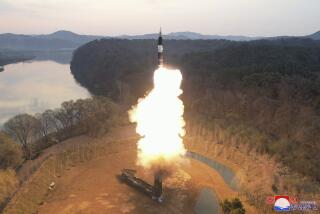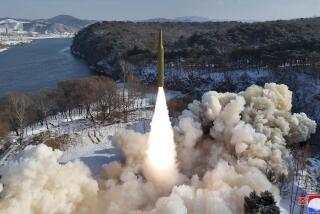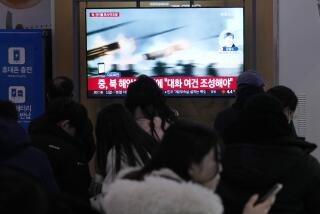North Korea’s ‘higher-level’ nuclear test explosion sets the region on edge

The Korean Central News Agency said in a statement that the test shows North Korea’s “toughest will” to be prepared to retaliate against any “provocation”
North Korea said it conducted a “higher-level” nuclear warhead explosion Friday, a fifth atomic test that set the region on edge, drew condemnations from across Asia and exacerbated fears that the country is making progress on its goal of developing the technology to wage a nuclear strike on the U.S.
State-run media in the North Korean capital of Pyongyang said the test moved the country closer to developing a “standardized” nuclear warhead capable of easy delivery on ballistic rockets.
The Korean Central News Agency said in a statement that the test shows North Korea’s “toughest will” to be prepared to retaliate against any “provocation” by “U.S.-led hostile forces who have gone desperate in their moves to find fault with the sovereign state’s exercise of the right to self-defense.”
See the most-read stories in World News this hour »
“The standardization of the nuclear warhead will enable [North Korea] to produce at will and as many as it wants a variety of smaller, lighter and diversified nuclear warheads of higher strike power,” the statement said. “This has definitely put on a higher level [North Korea’s] technology of mounting nuclear warheads on ballistic rockets.”
South Korean President Park Geun-hye called the latest detonation an act of “fanatic recklessness” on the part of the government of North Korean leader Kim Jong Un, who has overseen three nuclear tests since he took power in late 2011.
“The only thing that [the] Kim Jong Un regime can gain from the nuclear tests is stronger sanctions from the international community and its isolation,” she said in a statement. “Such provocation will eventually hasten its path to self-destruction.”
Experts say that the test marks a significant yet incremental step for North Korea’s nuclear weapons program.
“The same goes with every missile test,” said Duyeon Kim, a visiting senior research fellow at the Korean Peninsula Future Forum, an independent think tank in Seoul. “And the North has every technological, political, strategic and national reason to continue testing both nuclear devices and missiles, particularly if it wants fully functioning nuclear-tipped missiles.”
She added that the test is a sign that “sanctions alone have not blunted Pyongyang’s nuclear and missile programs.”
South Korea’s national security advisor, Cho Tae-yong, said the test was conducted in Punggye-ri, a remote nuclear test site in North Korea’s North Hamgyong Province. Shock waves of magnitude 5.3 were detected near Punggye-ri about 9:30 a.m., according to an earlier statement from South Korea’s Joint Chiefs of Staff. They called the event an “artificial” earthquake.
North Korea had previously conducted four nuclear tests, all at Punggye-ri, and they had caused similar patterns in seismic activity. This test, on the 68th anniversary of the nation’s founding, was its most powerful to date, a South Korean Defense Ministry spokesman said, according to Agence France-Presse.
Within hours of the test, North Korea’s neighbors were scrambling to respond. South Korean Prime Minister Hwang Kyo-ahn called an emergency meeting of top security officials. Japanese Prime Minister Shinzo Abe said in a statement that a suspected nuclear test by North Korea “could not be tolerated,” according to Reuters.
China’s environment ministry began emergency radiation monitoring along its northeastern border with North Korea, the state broadcaster CCTV reported on its official Sina Weibo microblog. Japan and the U.S. have dispatched jets to test for radiation.
President Obama said that any provocative actions by North Korea would have “serious consequences,” according to a statement by White House Press Secretary Josh Earnest.
China “strongly opposes” the nuclear test, the Chinese Foreign Ministry said in a statement on Friday, echoing statements that it has made after previous North Korean nuclear and missile tests.
“It is China’s firm stance to achieve denuclearization of the Korean Peninsula, prevent nuclear proliferation and promote peace and stability in Northeast Asia,” it said. “We strongly urge North Korea to keep its promise of denuclearization, comply with the related decisions made by the U.N. Security Council, and not to take any action to deteriorate the situation.”
NEWSLETTER: Get the day’s top headlines from Times Editor Davan Maharaj »
Zhang Liangui, a North Korea expert at the Central Party School of the Communist Party of China, said that Beijing would likely adopt any new sanctions that the U.N. decided to adopt against North Korea following the test.
“This is a critical moment to solve the crisis on the Korean Peninsula, so [I predict] the U.N. will adopt tougher sanctions against North Korea than ever before,” he said. “I think China will take more effective methods to carry out the sanction.”
Yet Beijing, despite its condemnations, remains a trading partner with North Korea and a source of aid. Chinese leaders fear that instability in Pyongyang could precipitate a flood of refugees into northeastern China and push a U.S.-friendly unified Korea right up to China’s doorstep.
“This nuclear test certainly places a burden on China, but I don’t think it will be [a] tipping point,” said Kim, the think tank fellow. “Beijing is unlikely to crack down on Pyongyang the way the international community desires because of its own strategic interests and because it believes in positive inducements like dialogue and a peace treaty to change North Korean behavior.”
Previous tests had been a stinging rebuke to pressure by Western governments and North Korea’s neighbors for Pyongyang to abandon its nuclear weapons program.
North Korea fired three medium-range ballistic missiles without warning Monday, according to the U.S. Strategic Command, which is responsible for being vigilant against possible nuclear attacks.
The No Dong missiles were fired from areas around the western city of Hwangju as China was hosting world leaders for the Group of 20 summit in the city of Hangzhou. The missiles were tracked over North Korea and into the Sea of Japan; they were determined to not have posed a threat to North America.
North Korea conducted its fourth underground nuclear test earlier this year. The country began developing its nuclear weapons program in the late 1980s, and its first test was in 2006.
Staff writer Kaiman reported from Beijing, and staff writer Hennigan from Washington.
Yingzhi Yang in the Times’ Beijing Bureau contributed to this report.
ALSO
Hostages weren’t found in attempted rescue in Afghanistan, U.S. officials say
Court postpones Palestinian elections indefinitely, a sign of growing tension with Hamas
Why a new opposition road map isn’t the breakthrough negotiators are seeking in Syria
UPDATES:
4:35 a.m.: This article has been updated with statements from the White House and think tank fellow Duyeon Kim.
Sept. 9, 12:35 a.m.: This article has been updated throughout with additional details.
10:45 p.m.: This article has been updated with North Korea’s statement confirming the nuclear test.
10:20 p.m.: This article has been updated with South Korean officials’ reports that a nuclear device was detonated.
8:55 p.m.: This article has been updated with staff reports.
This article was originally published on Sept. 8 at 7:45 p.m.
More to Read
Start your day right
Sign up for Essential California for news, features and recommendations from the L.A. Times and beyond in your inbox six days a week.
You may occasionally receive promotional content from the Los Angeles Times.







